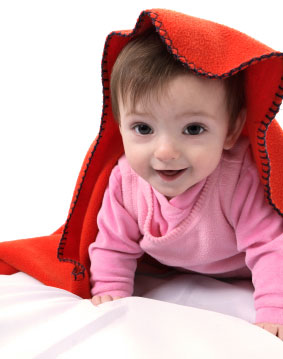7 Little Games to Develop Language Skills for 1-2 Year Old Babies
Parents are a child's first teachers, and promoting the development of language communication skills in your little one at home is crucial. The correct way of parent-child interaction is very important for both oral skills and behavioral cognition. The most effective way to educate young children is through learning while playing. Besides creating interesting life scenarios, regular small activities and games at home also serve as excellent teaching content and venues for language communication. Here are some small games for developing language skills in 1-2-year-old babies:
1. **Movement and Touch Games**
Stimulate the child’s interest by using actions and touching toys or body parts to enhance their understanding of body parts: touch the nose, clap hands, and guide the child to follow along.
2. **Cognitive Games**
Use building blocks or draw objects like trains, cars, cups, etc., and give verbal commands to guide the child to point out these items. Once the child becomes familiar with the names of the items, you can let them pick out the items themselves and encourage them to demonstrate their understanding of the item (e.g., an airplane flies high, a teacup holds water).
3. **Sentence Relay**
This helps train the child’s ability to form sentences. For example, if the child says "Mommy, shoes," the mother can extend the sentence by responding, "Mommy will help you put on your shoes."
4. **Bilingual Games**
Encourage the child to say the same thing in both Chinese and English. Sing English songs. When doing bilingual practice, parents should choose items that the baby is most familiar with and conduct the practice through games.
5. **Puppet Shows**
Develop the baby’s expressive abilities through language games with adults. Practice saying antonyms and recognizing colors. Teachers and children can have conversations with puppets and learn about colors.
6. **Is This Okay?**
Help the baby differentiate right from wrong and evaluate human behavior correctly. Cultivate the baby’s observational skills by letting them point out errors in certain behaviors. When the baby makes a mistake in judgment, parents should encourage rather than immediately negate their efforts.
7. **Guess What?**
Develop the baby’s thinking ability through sensory activities. Enhance the baby’s comprehension and thinking skills by letting them taste different flavors (sour, sweet, salty) and associate them with relevant things.
In fact, there are no secrets to cultivating language skills—just play with your child! Besides spending time together, parents should also appropriately guide their children in learning. For instance, playing with paper clay with your child can train their sense of touch; discussing what shapes to make can stimulate imagination; encouraging children to express their own ideas can help develop their oral expression skills.
Ultimately, language skill development boils down to consistent interaction and engagement. Playing and learning together fosters not only a strong bond but also enhances the child's overall cognitive and communicative growth.
